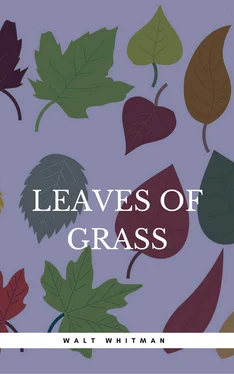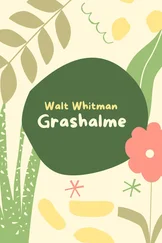Walt Whitman - Leaves of Grass
Здесь есть возможность читать онлайн «Walt Whitman - Leaves of Grass» — ознакомительный отрывок электронной книги совершенно бесплатно, а после прочтения отрывка купить полную версию. В некоторых случаях можно слушать аудио, скачать через торрент в формате fb2 и присутствует краткое содержание. ISBN: , Жанр: Языкознание, Критика, на английском языке. Описание произведения, (предисловие) а так же отзывы посетителей доступны на портале библиотеки ЛибКат.
- Название:Leaves of Grass
- Автор:
- Жанр:
- Год:неизвестен
- ISBN:9782377930524
- Рейтинг книги:4 / 5. Голосов: 1
-
Избранное:Добавить в избранное
- Отзывы:
-
Ваша оценка:
- 80
- 1
- 2
- 3
- 4
- 5
Leaves of Grass: краткое содержание, описание и аннотация
Предлагаем к чтению аннотацию, описание, краткое содержание или предисловие (зависит от того, что написал сам автор книги «Leaves of Grass»). Если вы не нашли необходимую информацию о книге — напишите в комментариях, мы постараемся отыскать её.
Leaves of Grass — читать онлайн ознакомительный отрывок
Ниже представлен текст книги, разбитый по страницам. Система сохранения места последней прочитанной страницы, позволяет с удобством читать онлайн бесплатно книгу «Leaves of Grass», без необходимости каждый раз заново искать на чём Вы остановились. Поставьте закладку, и сможете в любой момент перейти на страницу, на которой закончили чтение.
Интервал:
Закладка:
But in the transition period in which we now are, many varieties of Mediumship must be expected. There are those who stand in rapport with the diseased mentalities of the past and present, and pour forth as Divine Revelations the froth and scum of a receding age; they are the sponges who absorb the waste and impurities of humanity. They are also like running sores that gather the corrupt humors and drain the body of its most noxious fluids. There are others who come in contact with the outmost portion of the Spirit-life. These give crude, and in themselves, false notions of the state of man after death; yet they prepare the way for more truthful disclosures; if in no other way by stimulating the appetite for more substantial nourishment. There are those also who are lifted by genial inspirations to receive influxes from the upper mind-sphere of the age. They stand, as it were, on clear mountains of intellectual elevation, and with keenest perception discern the purer forms of new unfolding truths ere they become sufficiently embodied to be manifest to the grosser minds of the race. Of these, Ralph Waldo Emerson is the highest type. He sees the future of truths as our Spirit-seers discern the future of man; he welcomes those impalpable forms, as Spiritualists receive with gladdened minds the returning hosts of Spirit-friends.
There are other mediatorial natures who are in mental and heart-sympathy with man, as he now is, struggling to free himself from the tyranny of the old and effete, and to grasp and retain the new life flowing down from the heavens. And as the kindling rays at first produce more smoke than fire, so their lay is one of promise rather than performance. Such we conceive to be the interior condition of the author of “ Leaves of Grass .” He accepts man as he is as to his whole nature, and all men as his own brothers. The lambent flame of his genius encircles the world—nor does he clearly discern between that which is to be preserved and that which is but as fuel for the purification of the ore from its dross. There is a wild strength, a Spartan simplicity about the man, and he stalks among the dapper gentlemen of this generation, like a drunken Hercules amid the dainty dancers. That his song is highly mediatorial, he himself asserts, though probably he is unacquainted with the Spiritual developments of the age.
“Through me,” he sings, “many long dumb voices,
Voices of the interminable generations of slaves,
Voices of the diseased and despairing,
Voices of cycles of preparation and accretion,
And of threads that connect the stars,
And of the rights of them the others are down upon.
Through me forbidden voices—voices veiled,
Voices indecent, by me clarified and transfigured.”
We omit much even in this short extract, for the book abounds in passages that can not be quoted in drawing-rooms, and expressions that fall upon the tympanums of ears polite, with a terrible dissonance. His very gait, as he walks through the world, makes dainty people nervous, and conservatives regard him as a social revolution. His style is everywhere graphic and strong, and he sings many things before untouched in prose or rhyme, in an idiom that is neither prose nor rhyme, nor yet orthodox blank verse. But it serves his purpose well. He wears his strange garb, cut and made by himself, as gracefully as a South American cavalier his poncho. We will continue our quotations.
Such are the graphic pictures which this new world-painter flings from his easel and dashes upon the moving panorama of life. His night-thoughts are not less striking, as, borne by the Muse, he looks into every chamber, and hears the quiet breathing of slumbering humanity.
As the volume advances toward its conclusion, the Spirit of the poet becomes calmer and more serenely elevated. But everywhere his sympathy is with man, and not with conventionalisms.
We can not take leave of this remarkable volume without advising our friends, who are not too delicately nerved, to study the work as a sign of the times, written, as we perceive, under powerful influxes; a prophecy and promise of much that awaits all who are entering with us into the opening doors of a new Era. A portion of that thought, which broods over the American nation, is here seized and bodied forth by a son of the people, rudely, wildly, and with some perversions, yet strongly and genuinely, according to the perception of this bold writer. He is the young Hercules who has seized the serpents that would make him and us their prey; but instead of strangling, he would change them to winged and beautiful forms, who shall become the servants of mankind.
From Putnam’s Monthly, September, 1855
Walt Whitman’s Leaves of Grass .—Our account of the last month’s literature would be incomplete without some notice of a curious and lawless collection of poems, called “ Leaves of Grass ,” and issued in a thin quarto, without the name of publisher or author. The poems, twelve in number, are neither in rhyme nor blank verse, but in a sort of excited prose broken into lines without any attempt at measure or regularity, and, as many readers will perhaps think, without any idea of sense or reason. The writer’s scorn for the wonted usages of good writing, extends to the vocabulary he adopts; words usually banished from polite society are here employed without reserve and with perfect indifference as to their effect on the reader’s mind; and not only is the book one not to be read aloud to a mixed audience, but the introduction of terms, never before heard or seen, and of slang expressions, often renders an otherwise striking passage altogether laughable. But, as the writer is a new light in poetry, it is only fair to let him state his theory for himself. We extract from the preface:
The application of these principles, and of many others equally peculiar, which are expounded in a style equally oracular throughout the long preface—is made passim, and often with comical success, in the poems themselves, which may briefly be described as a compound of the New England transcendentalist and New York rowdy. A fireman or omnibus driver, who had intelligence enough to absorb the speculations of that school of thought which culminated at Boston some fifteen or eighteen years ago, and resources of expression to put them forth again in a form of his own, with sufficient self-conceit and contempt for public taste to affront all usual propriety of diction, might have written this gross yet elevated, this superficial yet profound, this preposterous yet somehow fascinating book. As we say, it is a mixture of Yankee transcendentalism and New York rowdyism, and, what must be surprising to both these elements, they here seem to fuse and combine with the most perfect harmony. The vast and vague conceptions of the one, lose nothing of their quality in passing through the coarse and odd intellectual medium of the other; while there is an original perception of nature, a manly brawn, and an epic directness in our new poet, which belong to no other adept of the transcendental school. But we have no intention of regularly criticizing this very irregular production; our aim is rather to cull, from the rough and ragged thicket of its pages, a few passages equally remarkable in point of thought and expression. Of course we do not select those which are the most transcendental or the most bold.
As seems very proper in a book of transcendental poetry, the author withholds his name from the title-page, and presents his portrait, neatly engraved on steel, instead. This no doubt, is upon the principle that the name is merely accidental; while the portrait affords an idea of the essential being from whom these utterances proceed. We must add, however, that this significant reticence does not prevail throughout the volume, for we learn on p. 29, that our poet is “Walt Whitman, an American, one of the roughs, a kosmos.” That he was an American, we knew before, for, aside from America, there is no quarter of the universe where such a production could have had a genesis. That he was one of the roughs was also tolerably plain; but that he was a kosmos, is a piece of news we were hardly prepared for. Precisely what a kosmos is, we hope Walt Whitman will take early occasion to inform the impatient public.
Читать дальшеИнтервал:
Закладка:
Похожие книги на «Leaves of Grass»
Представляем Вашему вниманию похожие книги на «Leaves of Grass» списком для выбора. Мы отобрали схожую по названию и смыслу литературу в надежде предоставить читателям больше вариантов отыскать новые, интересные, ещё непрочитанные произведения.
Обсуждение, отзывы о книге «Leaves of Grass» и просто собственные мнения читателей. Оставьте ваши комментарии, напишите, что Вы думаете о произведении, его смысле или главных героях. Укажите что конкретно понравилось, а что нет, и почему Вы так считаете.












